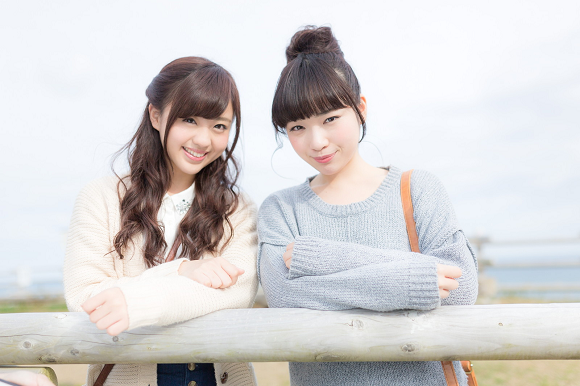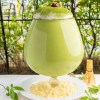
The scent, evocative of two fruits, was found to make women 74 percent more attractive.
Back when I was in college, an acquaintance of mine who was answering a survey listed his favorite smell as “young women.” I sort of figured he was either trying to be funny or suffering the psychological effects of a major dating dry spell, but it turns out he may have been on to something.
Researchers from Japanese company Rohto Pharmaceutical claim to have isolated two chemical compounds that young women produce in greater quantities than their older counterparts, thus giving them a unique smell. The discovery came as part of a broader study on body odor that Rohto was conducting, wherein they asked 500 women, ranging in age from their teens to 59, to wear the same clothing for 24 hours after taking a bath. Researchers then collected the clothes, blindfolded themselves, and smelled them, in one of those moments where the line between hard science and erotic anime becomes surreally blurred,
▼ No word on what exactly they used as blindfolds.
While the most prevalent smells had a slightly sour sweatiness to them, researchers also said that “We were surprised by a sweet aroma wafting up from [the clothes of younger women].” After further examination, it was determined that the sweet-smelling clothes owed their aroma to higher amounts of the acid compounds Lactone C10 and C11, which correspond to the fragrances of peach and coconut.
Lactone C10 and C11 were found in far greater amounts in the clothing worn by women in their teens and 20s than participants from other age groups, with Rohto pegging 35 at the age where the most dramatic drop-off occurs.
Not surprisingly, Lactone C10 and C11 were also found to have an effect on a woman’s perceived attractiveness. Going back to “science experiments that could be pervy anime storylines,” Rohto’s researchers looked at and evaluated a series of photographs of women.
▼ “Tanaka, this week your assignments are to sniff a pile of women’s laundry, then tell us which girls you think are hot.”
The same photo, when evaluated while the researcher was exposed to a mixed fragrance of Lactone C10 and C11, was 15 percent more likely to be judged as “feminine,” 47 percent more likely as “youthful,” and 74 percent more likely as “attractive.”
Armed with this information, Rohto says it plans to develop body soap and other grooming/wellness product packed with the power of Lactone C10 and C11, aimed at women who want to maintain an aura of youthful vivaciousness. If they’re really looking to maximize their profits, though, they might want to also look into marketing the products to men, too, considering that girlish-smelling body wipes became a sleeper hit with lonely dudes in Japan.
Source: Livedoor News/Sankei News via Hachima Kiko
Top image: Pakutaso
Insert images: Pakutaso (1, 2)
Follow Casey on Twitter, where you can easily replicate the “Casey smell” by using Sea Breeze body soap.



 Young woman-scent body soap and deodorant becomes a hit with lonely Japanese dudes
Young woman-scent body soap and deodorant becomes a hit with lonely Japanese dudes Cat-ear eye drops take Japan’s obsession with felines to a whole new level
Cat-ear eye drops take Japan’s obsession with felines to a whole new level Japanese beauty product prints English backwards on package so women can take better selfies
Japanese beauty product prints English backwards on package so women can take better selfies Japanese TV reveals the revolting truth about the source of jasmine’s alluring fragrance
Japanese TV reveals the revolting truth about the source of jasmine’s alluring fragrance Over 40 percent of Japanese high school girls say their dads smell bad in survey
Over 40 percent of Japanese high school girls say their dads smell bad in survey Foreigner’s request for help in Tokyo makes us sad for the state of society
Foreigner’s request for help in Tokyo makes us sad for the state of society Red light district sushi restaurant in Tokyo shows us just how wrong we were about it
Red light district sushi restaurant in Tokyo shows us just how wrong we were about it McDonald’s new Happy Meals offer up cute and practical Sanrio lifestyle goods
McDonald’s new Happy Meals offer up cute and practical Sanrio lifestyle goods Historical figures get manga makeovers from artists of Spy x Family, My Hero Academia and more
Historical figures get manga makeovers from artists of Spy x Family, My Hero Academia and more Japan’s massive matcha parfait weighs 6 kilos, contains hidden surprises for anyone who eats it
Japan’s massive matcha parfait weighs 6 kilos, contains hidden surprises for anyone who eats it French Fries Bread in Tokyo’s Shibuya becomes a hit on social media
French Fries Bread in Tokyo’s Shibuya becomes a hit on social media Starbucks Japan adds a Motto Frappuccino to the menu for a limited time
Starbucks Japan adds a Motto Frappuccino to the menu for a limited time Japanese ramen restaurants under pressure from new yen banknotes
Japanese ramen restaurants under pressure from new yen banknotes Godiva Dessert joins the cute crepe game in Harajuku
Godiva Dessert joins the cute crepe game in Harajuku Anime girl English teacher Ellen-sensei becomes VTuber/VVTUber and NFT
Anime girl English teacher Ellen-sensei becomes VTuber/VVTUber and NFT All-you-can-drink Starbucks and amazing views part of Tokyo’s new 170 meter-high sky lounge
All-you-can-drink Starbucks and amazing views part of Tokyo’s new 170 meter-high sky lounge Studio Ghibli releases new action figures featuring Nausicaä of the Valley of the Wind characters
Studio Ghibli releases new action figures featuring Nausicaä of the Valley of the Wind characters New private rooms on Tokaido Shinkansen change the way we travel from Tokyo to Kyoto
New private rooms on Tokaido Shinkansen change the way we travel from Tokyo to Kyoto Studio Ghibli glasses cases let anime characters keep an eye on your spectacles
Studio Ghibli glasses cases let anime characters keep an eye on your spectacles Tokyo Tsukiji fish market site to be redeveloped with 50,000-seat stadium, hotel, shopping center
Tokyo Tsukiji fish market site to be redeveloped with 50,000-seat stadium, hotel, shopping center Beautiful Ghibli sealing wax kits let you create accessories and elegant letter decorations【Pics】
Beautiful Ghibli sealing wax kits let you create accessories and elegant letter decorations【Pics】 Studio Ghibli releases Kiki’s Delivery Service chocolate cake pouches in Japan
Studio Ghibli releases Kiki’s Delivery Service chocolate cake pouches in Japan New definition of “Japanese whiskey” goes into effect to prevent fakes from fooling overseas buyers
New definition of “Japanese whiskey” goes into effect to prevent fakes from fooling overseas buyers Our Japanese reporter visits Costco in the U.S., finds super American and very Japanese things
Our Japanese reporter visits Costco in the U.S., finds super American and very Japanese things Studio Ghibli unveils Mother’s Day gift set that captures the love in My Neighbour Totoro
Studio Ghibli unveils Mother’s Day gift set that captures the love in My Neighbour Totoro New Japanese KitKat flavour stars Sanrio characters, including Hello Kitty
New Japanese KitKat flavour stars Sanrio characters, including Hello Kitty More foreign tourists than ever before in history visited Japan last month
More foreign tourists than ever before in history visited Japan last month New Pokémon cakes let you eat your way through Pikachu and all the Eevee evolutions
New Pokémon cakes let you eat your way through Pikachu and all the Eevee evolutions Sales of Japan’s most convenient train ticket/shopping payment cards suspended indefinitely
Sales of Japan’s most convenient train ticket/shopping payment cards suspended indefinitely Sold-out Studio Ghibli desktop humidifiers are back so Totoro can help you through the dry season
Sold-out Studio Ghibli desktop humidifiers are back so Totoro can help you through the dry season Japanese government to make first change to romanization spelling rules since the 1950s
Japanese government to make first change to romanization spelling rules since the 1950s Ghibli founders Toshio Suzuki and Hayao Miyazaki contribute to Japanese whisky Totoro label design
Ghibli founders Toshio Suzuki and Hayao Miyazaki contribute to Japanese whisky Totoro label design Doraemon found buried at sea as scene from 1993 anime becomes real life【Photos】
Doraemon found buried at sea as scene from 1993 anime becomes real life【Photos】 Tokyo’s most famous Starbucks is closed
Tokyo’s most famous Starbucks is closed One Piece characters’ nationalities revealed, but fans have mixed opinions
One Piece characters’ nationalities revealed, but fans have mixed opinions We asked a Uniqlo employee what four things we should buy and their suggestions didn’t disappoint
We asked a Uniqlo employee what four things we should buy and their suggestions didn’t disappoint Princesses, fruits, and blacksmiths: Study reveals the 30 most unusual family names in Japan
Princesses, fruits, and blacksmiths: Study reveals the 30 most unusual family names in Japan Keep your 2-D crush with you always with their special, AI-generated fragrance
Keep your 2-D crush with you always with their special, AI-generated fragrance Protect your eyes with moon prism power with limited edition Sailor Moon eye drops
Protect your eyes with moon prism power with limited edition Sailor Moon eye drops Survey finds more than half of Japanese women’s nieces don’t call them “aunt”
Survey finds more than half of Japanese women’s nieces don’t call them “aunt” Japanese company creates scratch and sniff cards that smell like the bellies of cats and dogs
Japanese company creates scratch and sniff cards that smell like the bellies of cats and dogs Wearing a white mask will make you less attractive, according to Japanese researchers’ experiment
Wearing a white mask will make you less attractive, according to Japanese researchers’ experiment Sayonara, smelly salarymen! Japanese company develops self-smell-checking device
Sayonara, smelly salarymen! Japanese company develops self-smell-checking device Hatsune Miku will protect your eyes from the dangers of staring at her for too long
Hatsune Miku will protect your eyes from the dangers of staring at her for too long Survey claims that 30 percent of boys’ love fans in Japan are men
Survey claims that 30 percent of boys’ love fans in Japan are men Japanese deodorant sheets for ladies smell so nice some guys don’t need the actual girl
Japanese deodorant sheets for ladies smell so nice some guys don’t need the actual girl Girls manga magazine comes with cool perfume mixing set, puzzling beauty advice columns
Girls manga magazine comes with cool perfume mixing set, puzzling beauty advice columns Many young Japanese people aren’t drinking sake these days
Many young Japanese people aren’t drinking sake these days Survey reveals Japan’s Generation Z dresses for social media, not for self-expression
Survey reveals Japan’s Generation Z dresses for social media, not for self-expression Is it OK to split the bill on a date in Japan? Survey asks what women and men of different ages think
Is it OK to split the bill on a date in Japan? Survey asks what women and men of different ages think Younger Japanese men less interested in drinking, according to survey
Younger Japanese men less interested in drinking, according to survey
Leave a Reply